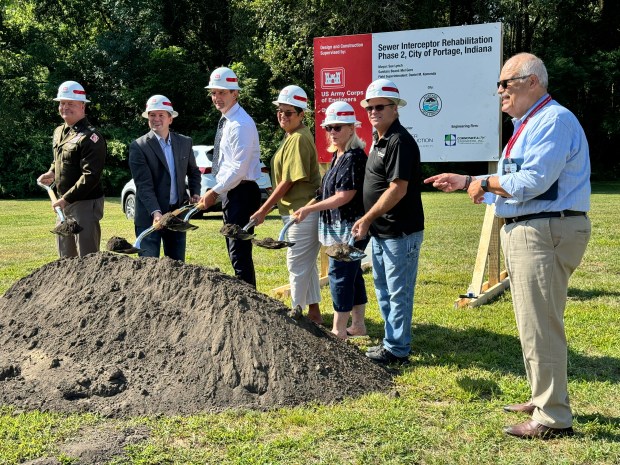Ground was broken Wednesday for a $1.5 million project to reline a portion of the main sewer line serving half the city of Portage.
Councilwoman Gina Giese-Hurst, D-1st. used her background in health care to explain the project. It’s like inserting a catheter and inflating the balloon, she said. Except in this case, the plastic sleeve relining the 1,600 feet of pipe not only improves the flow but also plugs leaks. Relining a pipe is significantly cheaper than replacing it.
The U.S. Army Corps of Engineers is funding 75% of the project cost, with the city paying the remaining $358,333.
U.S. Rep. Frank Mrvan, D-Highland, said the project will not only protect residents’ health and ability to keep using their toilets but also promote economic development.
“It’s only when something goes wrong that people think about it,” Mayor Austin Bonta said. The relining project, along with about $31 million in other projects to be executed with a series of sewer rate increases that begin Oct. 1, aims to reinforce the reliability of an aging sewer system.
Reducing infiltration into a leaky pipe reduces the volume being processed at the wastewater treatment plant.
This is the second phase of relining the main artery serving southern Portage. When finished, the interceptor line will be relined north to Central Avenue, near Swanson Road. A potential third phase would push north toward the treatment plant on Old Porter Road.
Col. Kenneth Rockwell, commander of the Corps of Engineers’ Chicago District, aims to protect the health and well-being of the city’s residents and businesses.
“You have to invest in your infrastructure to create everyday things,” Mrvan said.
“Fresh opportunities flow” from making sure sewage keeps moving efficiently, he said.
Bonta credited his predecessor, Sue Lynch, for starting the process for this week’s groundbreaking ceremony.
Doug Ross is a freelance reporter for the Post-Tribune.




